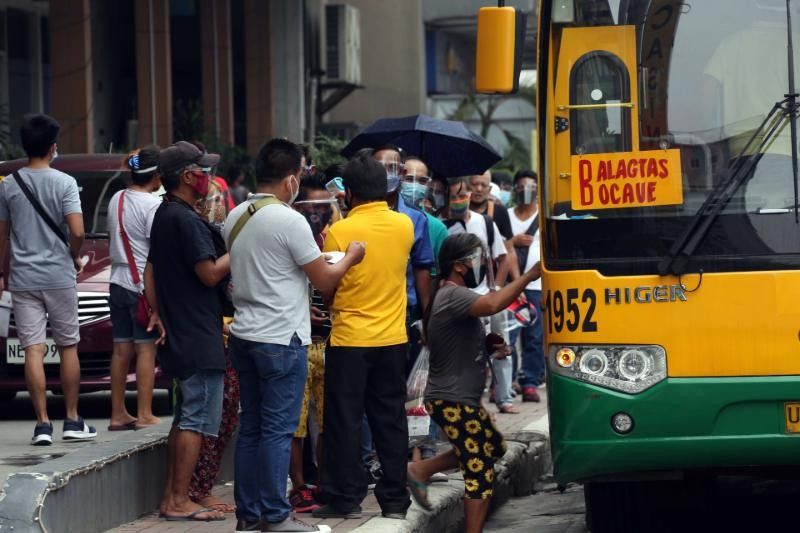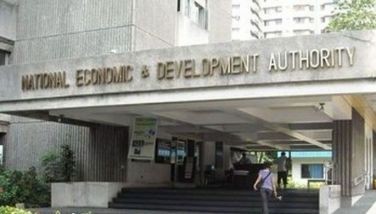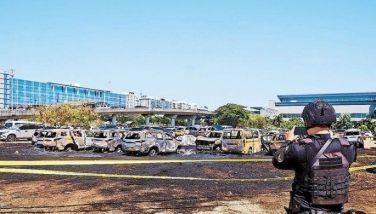Service contract scheme for PUVs may soon leave terminal

MANILA, Philippines — The Land Transportation Franchising and Regulatory Board is slowly inching toward its P5.6 billion service contracting scheme for public utility vehicles and now only requires its budget to be cascaded, it said Tuesday.
Speaking before reporters at an online media forum over Zoom, LTFRB chairman Martin Delgra said that the board sees service contracting as a possible business model for land transportation, calling the existing boundary system for traditional PUJs "outdated and financially unviable."
"We have adopted the net service contracting scheme...what this means is that fare collected by drivers, that's already theirs. It is to contract the service of the public utility vehicle operators. The government will also subsidize part of their operations," Delgra said. "We are now in the process of implementing it...We know there have been a lot of challenges on how reliable public transportation is."
Under service contracts, public utility jeepneys and buses will be paid a subsidy for every kilometer they run on required 18-hour operations daily, among other performance standards specified under these contracts. Any possible road violations will also be counted as a demerit.
Both modern and traditional PUJSs will get P11 per kilometer, while public utility buses will get P23.10 which will be liquidated and distributed to operators weekly.
"We also provided a merit and demerit scheme where drivers can have decreased earnings for the day depending on performance indicators...Up to date, we have 32,000 PUVs that are operating. We are targeting 60,000 na drivers to benefit," LTFRB technical division head Joel Bolano also said in mixed Filipino and English.
Bolano added that direct contracting will be done between LTFRB and traditional jeepneys, but for modern PUJs and PUBs, contracting will be done though cooperatives or corporations.
"As of now we are already starting to capture all the data and there is already a department order, guidelines, and procurement with our systems manager. Additional personnel is also in place, we're just waiting for budget to be cascaded to us before we start the program," he also said.
Senate lawmakers earlier found that the Department of Budget and Management has yet to release some P24 billion in funds allotted for agricultural loans and assistance to farmers, and P10 billion for the tourism sector. Other agencies have reportedly not yet received additional funding authorized under the Bayanihan 2.
Earlier, the Move as One transport coalition, which was among the transport collectives calling for service contracting, said that investing in service contract subsidies would protect the jobs of the 88% of households who do not have cars and commute to work, citing a figure from the Japan International Cooperation Agency.
Piston: Release clear guidelines first
Delgra added that the boundary system, where the income of operators and drivers depends solely on the number of passengers they have, leads to "operators unwillingness to operate" amid the COVID-19 pandemic. However, transport collectives such as Piston have long been calling for the full return of all traditional jeepneys idled for months following the suspension of public transportation in March.
In a phone call with Philstar.com Tuesday, Piston president Mody Floranda called on LTFRB to communicate its guidelines and key performance indicators to operators, saying that drivers and operators on the ground still did not have not been informed about the forthcoming scheme.
Floranda was careful to mention that Piston was generally in support of the service contracting scheme, saying most jeepney drivers earned around P9 per kilometer. "One big problem there is who decides who's included in service contracting? The problem is they have not even given transport workers clear deadlines on what is going to happen," he said.
At the press conference, Delgra projected that 60,000 drivers would benefit from the scheme with the board looking at contracting some 30,000 PUV units with two drivers per unit. "It isn't the LTFRB that chooses the drivers. The operators choose their own drivers," he asserted, though it is not clear how the units themselves will be selected and cleared for contracting.
The transportation department has often asserted that all public utility vehicles must pass roadworthiness standards set by the Land Transportation Office before being allowed to ply their routes, which the DOTr has, over the pandemic, often brought up when asked about the lack of jeepneys on the road.
READ: Nearly a month into GCQ, gov't uncertain on jeepney's fate
However, the LTO for its part has not been keen on answering questions about its standards and how many jeepney operators and units have applied for road selection—all this, as the department continues to pursue its jeepney phaseout under its PUV modernization program.
"Why only [30,000] units? Our call is still for a 100% return for all traditional jeepneys...restrictions for COVID have already been loosened, we've already opened malls, restaurants, so to really uplift the economy they should also be opening our transportation," Floranda added.
The board's figure of 32,000 PUVs allowed to operate is still just a fraction of the LTFRB's own figure of 74,000 traditional PUJs left idled in Metro Manila—leaving less than half, or just 43% of drivers and operators, still living with a livelihood over the pandemic.
According to Floranda, though, Piston estimates around 200,000 traditional jeepney units and 150,000 drivers in the National Capital Region alone.
- Latest
- Trending
































